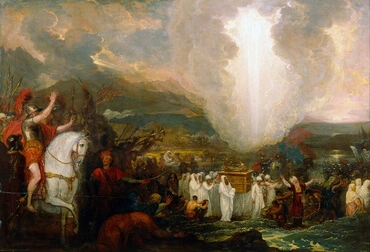Jordania (el río)

El río Jordán separa la tierra de Canaán de las tierras del este. Esta separación representa la división de la mente humana en una parte interna y otra externa, y es la mente interna donde se forma la iglesia en una persona.
El río también está limitado por dos lagos en el norte, Merom y Galilea, y el Mar Muerto en el sur. Dentro de estos límites están las cosas interiores de la mente, y fuera están las cosas exteriores.
Los países del exterior, tal y como se mencionan en la Biblia, pueden ser útiles. Representan el conocimiento básico, la capacidad de razonamiento, la racionalidad, la curiosidad y otras cualidades que, como amigos, pueden apoyar nuestras creencias religiosas, o como enemigos pueden argumentar contra ellas o conjurar falsos dioses para que los adoremos.
La tierra interior representa un estado de regeneración, o puede representar el fin último de ese estado, que es el cielo.
Desde fuera, pues, el Jordán es la entrada a algo mejor, la meta del viaje, y sus aguas representan el lavado mental del arrepentimiento, que es lo primero de la iglesia, por eso Juan bautizó allí, y Naamán se lavó allí.
Desde el interior, el Jordán es el borde de lo que está fuera de la iglesia, y por esta razón los Hijos de Israel fueron tan a menudo molestados por esas naciones de afuera: los madianitas, los amonitas, los sirios, Egipto y Babilonia, y las otras naciones de las que leemos en los Libros de los Jueces y los Reyes, y en los Profetas.
Las capacidades mentales de nuestras mentes externas pueden trabajar para lo que es bueno, pero también pueden trabajar para lo que es malo.
(Referencias: Arcana Coelestia 1585 [1-3], 4255; Apocalipsis Explicado 514 [19], 700 [11-13])
Scriptural Confirmations #98
98. 5. I will deliver thee out of the hand of the evil, and I will redeem thee out of the hand of the violent (Jeremiah 15:21).
Jehovah will gather Israel, and keep him, as a shepherd doth his flock. For Jehovah hath redeemed Jacob, and freed him from the hand of him that was stronger than he (Jeremiah 31:10-11). Throughout the whole of this chapter, and also Chapter 33, the redemption and liberation of men of the church is treated of. But in the former chapters from the first up to this one the vastation of the church is treated of.
Behold the days come in which I will make a new covenant; not according to the covenant that I have made, for they have made void this covenant. But this shall be the covenant that I will make after those days, I will put My law in their midst, and I will write it upon their hearts, and I will be their God, and they shall be My people. Nor shall they teach, a man his companion, nor a man his brother; Know Jehovah: for they shall all know Me, from the least of them unto the greatest of them (Jeremiah 31:31-34, 38). This is said of the New Church after redemption.
N. B. That is the day of the Lord Jehovih of Hosts, a day of vengeance, that he may take vengeance on His adversaries (Jeremiah 46:10).
Because the day of calamity shall come upon Egypt, the time of their visitation (Jeremiah 46:21).
Their Redeemer is strong, Jehovah of Hosts is His name (Jeremiah 50:34).
Concerning the day of the visitation upon Babylon, in which vengeance must be taken upon it (Jeremiah 50:18, 27-28, 31).
The time of the vengeance of Jehovah, and of retribution (Jeremiah 51:6).
Jehovah of Hosts is the Former of all things, and of the rod of His inheritance by which He will do judgment (Jeremiah 51:19-23).
It is also called the time of the harvest of Jehovah of Hosts, the God of Israel (Jeremiah 51:33).
The day of the vengeance of Jehovah, the vengeance of His temple (Jeremiah 51:11).
The days in which He will visit upon Babylon (Jeremiah 51:44, 47, 52).
It is called the day of evil (Jeremiah 51:2).






